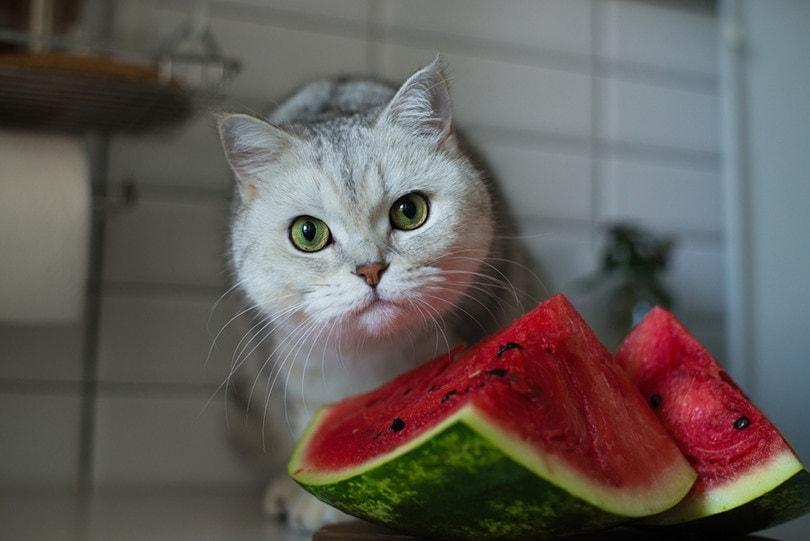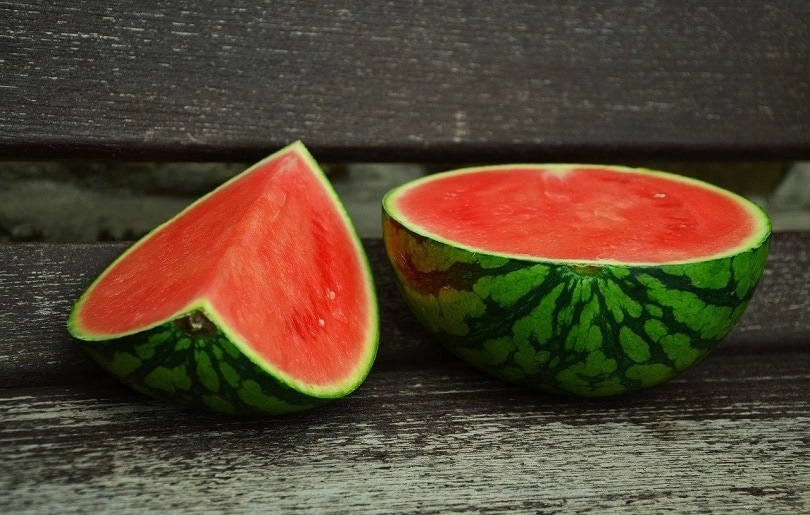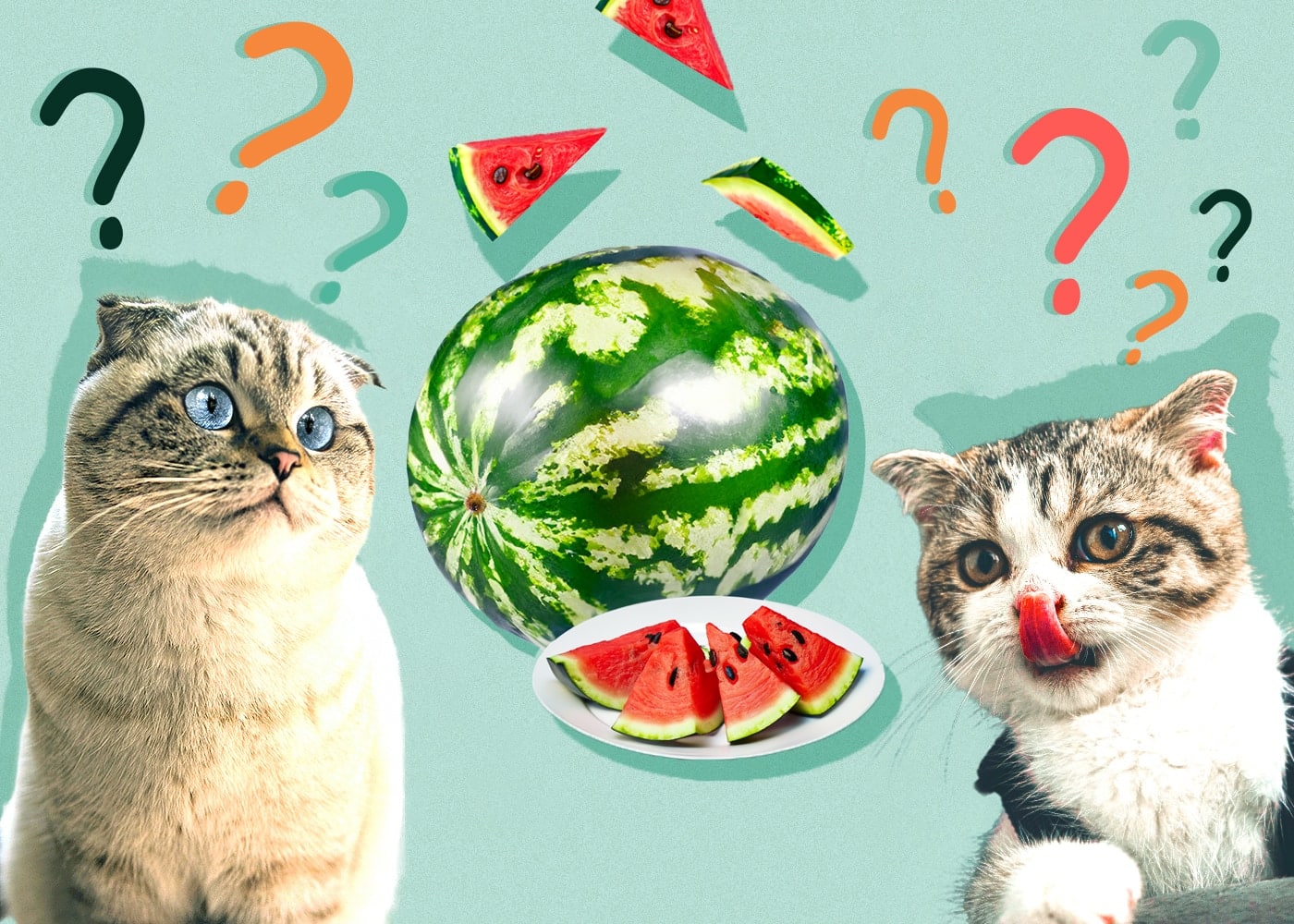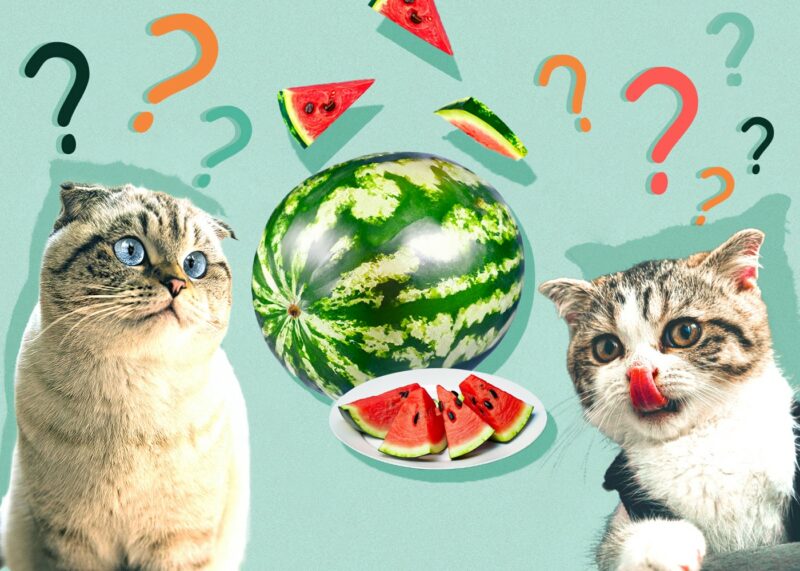During the hot summer months, a slice of watermelon always sounds good. While humans enjoy it and can get plenty of benefits from this tasty snack, can cats eat watermelon? The answer is yes, cats can eat small amounts of watermelon. Let’s find out more in this article.
Do Cats Like Watermelon?
Some cats will love to nibble on watermelon, while others will turn their nose up at something so different. Either way, watermelon provides nutrients that cats can benefit from, like vitamin A and lycopene. The high water content can provide much-needed hydration during hot weather.
If your cat does like watermelon, it would be for the texture or the simple novelty of licking it—but not its sweet taste. Research has shown that cats can’t taste sweet foods the way we can, because they have no receptors for sweetness on their tongues. So, we really have no way of knowing what watermelon tastes like to a cat.

Can Cats Be Allergic to Watermelon?
Anytime you feed your cat a new food, you may be concerned about possible allergies and adverse reactions. Rest assured, food allergies in cats are extremely rare, with only 1% of all cats being allergic to some type of food. Furthermore, the most common foods that cats are allergic to are beef, dairy, fish, and chicken.
Signs of a food allergy in cats include excessive itching and gastrointestinal issues. If you suspect your cat had a reaction to watermelon, call your vet for guidance.
Health Concerns About Watermelon for Cats
Watermelon’s sugar content makes it unhealthy to give to cats with diabetes or cats that are obese. You should also avoid giving your cat watermelon—or any other people food—if they are on a prescription diet.

How Much Watermelon Can a Cat Have?
First and foremost, remember the adage, “Everything in moderation.” Watermelon isn’t something your cat should eat every day. Two dietary concerns with feeding a cat watermelon are calories and sugar. For reference, ¼ cup of diced watermelon contains 12 calories and 2.36 grams of sugar. For a cat, those small numbers have a big impact.
Watermelon, table scraps, and commercial cat treats—really anything other than cat food—should make up less than 10% of your cat’s daily caloric intake. Your vet is your best resource for how many calories your pet needs, but this cat daily calorie requirement chart is a good reference.
For example, a healthy, 10-pound neutered adult cat should eat 262 calories each day, of which 26 calories could be a treat like watermelon. However, ½ cup of watermelon is too much for a cat, as you also have to consider the sugar content. As an obligate carnivore, your cat’s digestive system is designed to process animal protein, not sugar. Too much watermelon can throw their digestive system for a loop and not in a fun rollercoaster way!
So, how much watermelon can you offer your cat? Only as much as they can eat in a bite or two. A good serving size for most cats would be the size of a pair of dice. You can make watermelon last longer by giving your cat frozen watermelon.
How to Feed Watermelon to a Cat
You should only give your cat the flesh of a watermelon. Remove the rind and any seeds, as both can be difficult to digest.
Are Watermelon Seeds Toxic for Cats?
Many of us were told growing up that if we swallowed a seed while we ate the watermelon, it would take root in our stomachs. This is definitely not true for humans and isn’t for cats either! However, watermelon seeds are big enough to present a choking hazard for most cats so it’s best to avoid them.
You may have also heard that some fruit seeds contain trace amounts of poisonous cyanide. According to a study, there is 0.79mg±0.01 cyanide per 100 g of watermelon seeds. On the contrary, roasted watermelon seeds are a popular human snack. That being said, you shouldn’t feed your cat watermelon seeds as they have the potential to cause an upset stomach. If your cat does manage to eat a seed or two, monitor them closely and check for signs of an stomach upset.

In Summary
It is fine to give your healthy cat the occasional small chunk of watermelon. Be sure to factor these calories into your cat’s daily intake. Obese cats and those with diabetes should not have watermelon due to the high sugar content. Remove the rind and seeds before giving watermelon to your cat.
Featured Photo Credit: Ruslana Chub, Shutterstock











